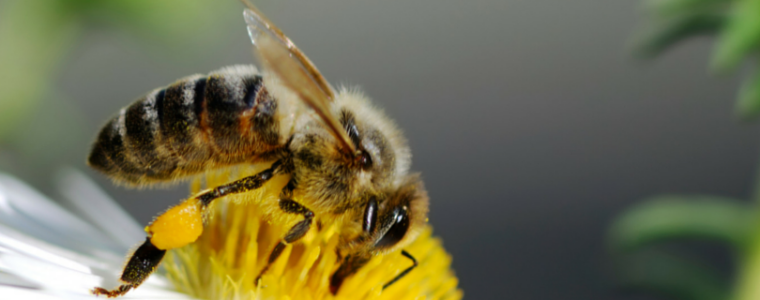
Not long ago, someone asked my advice about a bee hive in her yard. I contacted Ruth Brooks at Freedom Center for Wildlife and she steered me to the New Jersey Beekeepers Association. I knew there was a crisis in the honey bee population, but I learned a whole lot more – including that the honeybee is New Jersey’s State insect, and that it’s illegal to kill them in the Garden State. Most North American honeybees are the gentle, Italian variety. Honeybees will not sting unless provoked. And they only sting once before they die.
Honeybee populations have suffered periodic, extreme declines over the past twenty years. In 2006, many hives in the U.S. succumbed to “colony collapse.” The exact cause remains a mystery. The varroa mite, a parasite which causes bees to die before their time and kills their larvae, is suspected to be one cause of decreasing numbers. Other causes may be fungal infections, air pollution, and loss of habitat due to development.
Mild winter weather also plays a part in bee survival rates. An article by Eunice Lee of The Star-Ledger (March 09, 2012) is posted on the website of our local district: Central Jersey Beekeepers Association. In it, Lee quotes state apiarist (bee expert), Tim Schuler, of the NJ Department of Agriculture. “Cold is not what kills bees,” said Tim Schuler. “Running out of food is what kills bees.” When winters are mild, bees go out on extra, nonessential flights. So instead of resting in a semi-dormant state in the hive, they are active and eating through their (about seventy pounds of) stored honey. So there’s not enough food to last until spring flowers bloom and produce nectar and pollen for them. Bees starve. We need honeybees to pollinate our crops. On average bees will forage over an area of 28,000 acres. Lee quotes Schuler again, “…honeybees are vital to the Garden State. New Jersey’s 10,000 bee colonies represent a $2.5 million honeybee industry for the state and contribute to the production of nearly $200 million worth of fruits and vegetables……crops like blueberries, cranberries, apples, cucumbers, squash, watermelons, cantaloupes, pumpkins and strawberries. And the business of bees is just as important to New Jersey’s 3,000 registered beekeepers.”
One area of controversy in the decline of bees involves the new class of systemic pesticides (neonicotinoids) such as clothianidin. These chemicals show up in plant nectars which are taken in by the bees. Neonicotinoids have been used for over a decade. But several European countries have banned their use. Clothianidin opponents hold that by taking chances with the bee population, we put the entire food chain at risk.
There is also new promise from bees. An article in US News and World Report by Jason Koebler (March 8, 2013) reports that bee venom may prevent or cure HIV. Koebler writes, “Scientists at the Washington University School of Medicine in St. Louis found that melittin, a toxin found in bee venom, physically destroys the HIV virus, a breakthrough that could potentially lead to drugs that are immune to HIV resistance. The study was published in the journal Antiviral Therapy.”
One thing most can agree on: when honeybees are thriving, that ties into the vitality of all plant and wildlife; and ultimately safeguards our planet’s complex webs of life. The Beekeepers urge us to visit http://www.njbeekeepers.org “… to find out about bee-friendly plants you can cultivate, and other ways you can help the honey bee.”
By: Susan Reel-Panish
